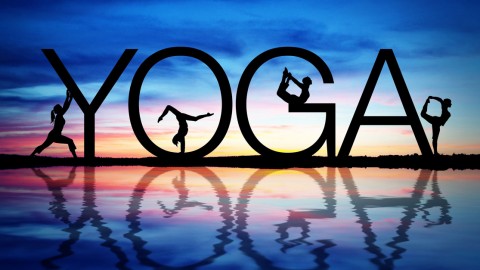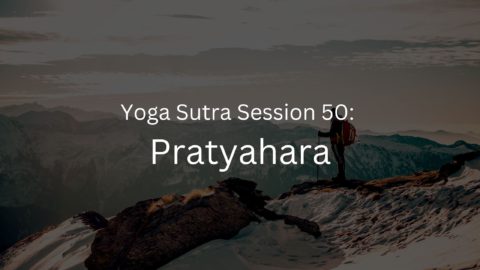THEIR CESSATION IS BROUGHT ABOUT BY PERSISTENT INNER PRACTICE AND NON- ATTACHMENT. OF THESE TWO, abhyasa THE INNER PRACTICE IS THE EFFORT FOR BEING FIRMLY ESTABLISHED IN ONESELF.
The essence of abhyasa is to be centered in oneself. Whatsoever happens, you should not move immediately. First you should be centered in yourself, and from that centering you should look around and then decide.
Someone insults you and you are pulled by his insult. You have moved without consulting your center. Without even for a single moment going back to the center and then moving, you have moved.
Abhyasa means inner practice. Conscious effort means, “Before I move out, I must move within. First movement must be toward my center; first I must be in contact with my center. There, centered, I will look at the situation and then decide.” And this is such a tremendous, such a transforming phenomenon. Once you are centered within, the whole thing appears different; the perspective has changed. It may not look like an insult. The man may just look stupid. Or, if you are really centered, you will come to know that he is right, “This is not an insult. He has not said anything wrong about it.”
I have heard that once it happened – I don’t know whether it is true or not, but I have heard this anecdote – that one newspaper was continuously writing against Richard Nixon, continuously! – Defaming him, condemning him. So Richard Nixon went to the editor and said, “What are you doing? You are telling lies about me and you know it well!” The editor said, “Yes, we know that we are telling lies about you, but if we start telling truths about you, you will be in more trouble!”
So if someone is saying something about you he may be lying, but just look again. If he is really true, it may be worse. Or, whatsoever he is saying may apply to you. But when you are centered, you can look about yourself also dispassionately.
Patanjali says that of these two, abhyasa – the inner practice – is the effort for being firmly established in oneself. Before moving into an act, any sort of act, move within yourself. First be established there-even if for only a single moment – and your action will be totally different. It cannot be the same unconscious pattern of old. It will be something new, it will be an alive response. Just try it. Whenever you feel that you are going to act or to do something, move first within, because whatsoever you have been doing up until now has become robot-like, mechanical. You go on doing it continuously in a repetitive circle.
Just note down a diary for thirty days – from the morning to the evening, thirty days, and you will be able to see the pattern. You are moving like a machine; you are not a man. Your responses are dead. Whatsoever you do is predictable. And if you study your diary penetratingly, you may be able to decipher the pattern – that Monday, every Monday, you are angry; every Sunday you feel sexual; every Saturday you are fighting. Or in the morning you are good, in the afternoon you feel bitter, by the evening you are against the whole world. You may see the pattern. And once you see the pattern then you can just observe that you are working like a robot. And to be a robot is what is the misery. You have to be conscious, not a mechanical thing.
Gurdjieff used to say that, “Man is machine, as he is. You become man only when you become conscious. And this constant effort to be established in oneself will make you conscious, will make you non-mechanical, will make you unpredictable, will make you free. Then someone can insult you and you can still laugh; you have never laughed before. Someone can insult you and you can feel love for the man; you have not felt that before. Someone can insult you and you can be thankful towards him. Something new is being born. Now you are creating a conscious being within yourself.”
But the first thing to do before moving into act, because act means moving outward, moving without, moving toward others, going away from the self. Every act is a going away from the self. Before you go away, have a look, have a contact, have a dip in your inner being. First be established.
Before every moment, let there be a moment of meditation: this is what abhyasa is. Whatsoever you do, before doing it close your eyes, remain silent, move within. Just become dispassionate, non-attached, so you can look on as an observer, unprejudiced – as if you are not involved, you are just a witness. And then move!
One day, just in the morning, Mulla Nasrudin’s wife said to Mulla that, “In the night, while you were asleep, you were insulting me. You were saying things against me, swearing against me. What do you mean? You will have to explain.” Mulla Nasrudin said, “But who says that I was asleep? I was not asleep. Just the things I want to say, I cannot say in the day. I cannot gather so much courage.”
In your dreams, in your waking, you are constantly doing things, and those things are not consciously done – as if you are being forced to do them. Even in your dreams, you are not free. This constant mechanical behavior is the bondage. So how to be established in oneself? Through abhyasa.
Sufis use continuously. Whatsoever they say, do; they sit, stand, whatsoever… Before a Sufi disciple stands, he will take Allah’s name. First he will take God’s name. He will sit, he will take God’s name. An action is to be done – even sitting is an action – he will say, ‘Allah!’ So, sitting, he will say, ‘Allah!’ Standing he will say, ‘Allah!’ If it is not possible to say loudly, he will say inside. Every action is done through the remembrance. And by and by, this remembrance becomes a constant barrier between him and the action – a division, a gap.
And the more this gap grows, the more he can look at his own action as if he is not the doer. Continuous repetition of Allah, by and by, he starts seeing that only Allah is the doer. “I am not the doer. I am just a vehicle or an instrument.” And the moment this gap grows, all that is evil falls. You cannot do evil. You can do evil only when there is no gap between the actor and the action. Then good flows automatically.
Greater the gap between the actor and the action, more the good. Life becomes a sacred thing. Your body becomes a temple. Anything that makes you alert, established within yourself, is abhyasa.
Tags: Yoga Sutra 4.1 Abhyasa










